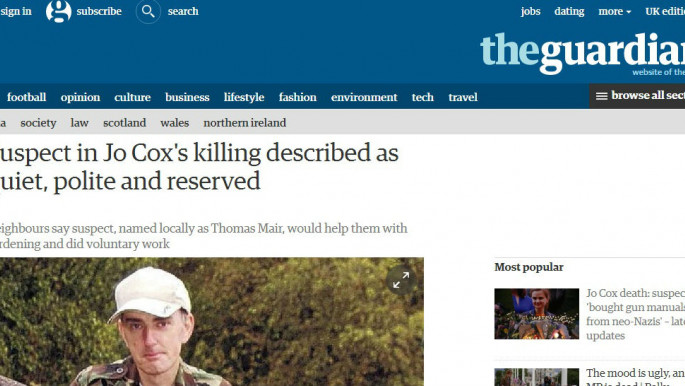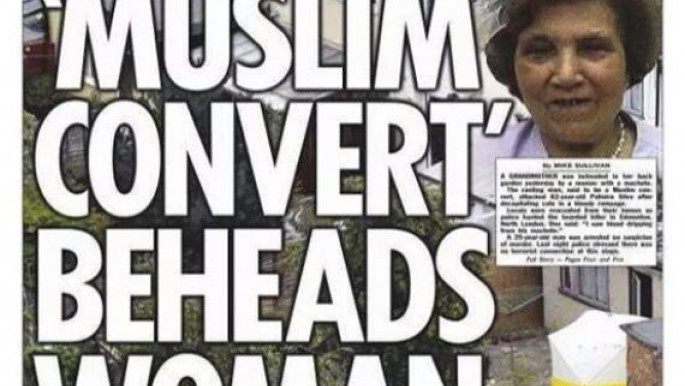Jo Cox killing: The media's selective labelling of 'terror'
Jo Cox killing: The media's selective labelling of 'terror'
A British public official has been murdered and the only suspect has links to right-wing white supremacist groups – why is this man not a terrorist, asks Taufiq Wan.
7 min read
Thomas Mair has been linked to far-right extremist groups [screenshot]
A day after the horrific killing of Labour Party MP Jo Cox, Britain is reeling from this tragic event that has shocked the nation and brought its politics to a standstill.
Shot three times and stabbed in broad daylight by a man, who according to an eyewitness shouted "Britain First," – the name of a far-right extremist group – the 41-year-old mother-of-two became the first MP to be murdered in more than a quarter of a century.
But in the wake of this painful loss, the glove-handed approach of Britain's media toward the crime's sole suspect must be called to account.
With no shortage of enthusiasm to leap upon claims of Islamic extremism, and indeed to splash the word 'terrorism' across front pages when a suspect's racial or religious profile fits a certain criteria, media coverage of this tragedy again raises legitimate concerns about media bias.
The 'reserved and polite' suspect
Within hours of the Thursday's tragic event, details of the suspect detained by police had already emerged. Thomas Mair, a 52-year old male who has been shown to have had long-standing links to far-right racist groups both in the UK and abroad.
Mair, who is known to have suffered from mental illness, was named as a supporter of the Springbok Club – an online publication that has defended the now defunct white supremacist apartheid regime in South Africa.
By late evening in the UK on Thursday, a report had also emerged from the Southern Poverty Law Center in the US claiming that "Mair was a dedicated supporter of the National Alliance, the once premier neo-Nazi organisation in the USA."
Given such information, it is curious as to why major British news outlets – from across the ideological spectrum – had chosen to omit this information from many of their news headlines and summaries, leaving perhaps the most crucial details about the killer's motive out of the most eye-catching part of a story.
"Suspect in Jo Cox's killing described as quiet, polite and reserved," read the title of an article published by the Guardian on the day of the Murder – which was quite oddly followed by a nod to Mair's love of gardening and voluntary work in its sub-heading.
 |
| The Guardian article headed by a description of the 'polite and reserved' murder suspect [screenshot] |
"Man arrested in connection with Jo Cox attack was a 'loner' with 'history of mental health problems'" was the Telegraph's take on the same story.
Meanwhile, The Sun – a right-leaning tabloid infamous for its sensationalist articles about immigrants and radical Islam – bizarrely chose to include rumours that the suspect used kitchen products to clean himself in the headline of its article about the neo-Nazi linked suspect, while of course omitting information about Mair's racist links from the title.
 |
Rather, The Sun chose to focus the header on Mair's life as a "loner" who lived on a council estate for 40 years.
The Murdoch-owned paper's decision not to sing from the hills about Mair's right-wing links in the crime's immediate aftermath is rather curious, given that it has not shied away from controversy when crimes have allegedly involved Muslims in the past.
 |
The Murdoch-owned paper's decision not to sing from the hills about Mair's right-wing links is rather curious, given that it has not shied away from controversy when crimes have allegedly involved Muslims in the past |  |
 |
|
| 'Fear mongering': The Sun's frontpage from September 2014 [The Sun] |
For Salvador – a man of Nigerian descent, his mental state was not the bold focus of news headlines.
This double standard by the mainstream press reinforces accusations about their strange preferential treatment of the perpetrators of potentially ideologically-motivated crimes who happen to be Caucasian.
Neglecting the facts
While omitting Mair's right-wing links from their headlines on the day after the murder, the aforementioned newspapers did in fact include information about his extremist links in their stories. This, however, was largely padded with charming information about the suspect's peculiar personal life.
"His half-brother, who is mixed race, claimed he had been volunteering at a school for children with disabilities for several years and had never expressed any racist views," read the Guardian article.
Mair was also a "devoted son who shopped for their mother twice a week and who had visited her on Wednesday night to help tune her TV," according to another acquaintance quoted by the London newspaper.
By focusing on such mundane facts, some British media outlets have dangerously downplayed the possible role of right-wing racism in the attack.
 |
By focusing on such mundane facts, British media outlets have dangerously downplayed the possible role of right-wing racism in the attack |
 |
In an age where many scroll briefly through social media feeds to scan through headlines for news updates, this is simply irresponsible, if not disingenuous.
Remember the victim, not the perpetrator
Twitter Post
|
However, to righteously avoid focus on information about the killer in the name of respect for the victim is arguably an affront to Cox's legacy. Firstly, by using tributes to her as a way of avoiding uncomfortable discussions about right-wing extremism in the UK, all involved in this unfolding discussion are doing a disservice to the memory of a woman who fought against the kind of narrow mindedness and xenophobia that may have motivated Mair.
Secondly, by blindly focusing on the victim of the attack, there is an indication that the safety of potential victims of further far-right related violence is not important.
This would hardly have been the case had the suspect been linked to Islamic extremism, where talk of terror networks and coordinated attacks would have had the media speculating about public safety.
Given that Britain First – the group whose name Mair allegedly shouted out – has regularly stormed into mosques and even held 'activist training camps' involving combat and defence training, the British media's focus on the safety of MPs rather than that of far-right hate targets like Muslims or refugees, is quite telling of the press establishment's view on who in British society is deserving of their attention.
Terrorism?
The murder of Jo Cox on Thursday has attracted international condemnation and once again many are left scratching their heads regarding what exactly constitutes an act of 'terrorism.'
On the day of the attack, the Guardian published its official line on the killing of the Yorkshire MP, saying that it was "an attack on humanity, idealism and democracy."
But there was no mention of terror, as was the case in many other major British news outlets.
A notable summation of the events thus far has come from Britain's right-wing Spectator magazine, who in their 'A Day of Infamy' piece noted quite rightly that "we know that lone lunatics don't live in a bubble. They are influenced by outside events."
Twitter Post
|
When a public official is murdered carrying out their duty, in an act that has struck fear into many, it remains a mystery as to why this heinous act has not been branded as an act of terror.
When the only suspect held by police has been linked to far-right extremist groups, after an attack committed amid heightened fears about immigration in the lead up to Britain's EU referendum vote, it is once again a mystery as to why the alleged perpetrator of this act has not been called a potential terrorist.
This leaves many, quite justifiably, wondering whether the labels of 'terror' and 'terrorism' are reserved only for people of a certain religious background or skin colour, by a media establishment that will selectively represent the facts when the case is otherwise.
In the end, this is not a call for a blanket application of sensationalism by the media in all case of people suspected of public atrocities, nor a flippant use of the word 'terror.' Rather, this brief look into the British media coverage of Jo Cox's killer in the first day after her death acts to highlight the double standard that is often applied to crime suspects of different backgrounds. This double standard is unhelpful, stirs resentment between communities and breeds mistrust of both each other and of the media.
While many news outlets in the coming days may begin to make more of Tommy Mair's racist links, it remains clear that some major newspapers and websites seem notably uneager to pounce upon leads indicating a motive behind the attack – perhaps because those leads don't point towards radical Islam.



